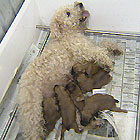Breed: Soft Coated Wheaten Terrier
Temperament: active, exuberant
Lifespan: 10 – 14 years
Maintenance: medium
Recommended for: families
History
The Soft Coated Wheaten Terrier is an obscure breed whose history is steeped in Irish peasant heritage.
Originally developed in Southern Ireland, with influences possibly from the Kerry Blue and Irish Terrier Breeds, the Wheaten type became a popular working companion of the Irish peasants and crofters – the name given to those who tended plots leased out by wealthy land holders.
The Wheaten’s popularity stemmed from its versatility as an all-purpose working farm dog. Instilled with its natural terrier instinct to hunt small game and rodents is a calmer disposition (by terrier standards), suiting it to other skills like herding, guarding and droving.
Simply regarded as a peasant dog, the Wheaten was not officially issued its present name until 1937 when it was recognised as a separate breed by Irish canine authorities. Soft Coated Wheatens first appeared in British dog shows in the 1940s and were introduced to Australia in the 1970s. Not as well known as other terrier breeds, there are currently only about 8 breeders Australia wide.
Appearance
A medium sized terrier a little smaller than an Australian Cattle Dog with a soft coat that falls in loose curls or waves. The coat colour resembles that of ripening wheat. The head is long, the eyes are covered with a thick fringe of hair and a long beard generally surrounds the snout. Wheaten pups in Australia are often born a dark brown colour, the wheaten colour developing with maturity. There are two distinct types of coat; the Irish, with a silky pale coat forming into curls, or the more popular Anglo-American, a heavier, less shiny coat. The coat is intermediate, not wiry like some terrier types but neither fluffy like long coat breeds. Tails are usually docked, however this is optional for show dogs.
Temperament
Lively, inquisitive and gregarious, the Wheaten is loyal and full of confidence. Like most terriers, the Wheaten is an intelligent if somewhat easily distracted breed. Wheatens are known to behave in a puppy-like manner throughout their life, especially when it comes to jumping up onto their human friends and giving what’s known as the Wheaten hug. Firm but fair discipline from an early age is essential and will help curb the dog’s natural exuberance. Wheatens make excellent watch dogs, generally barking to announce strangers, however they are not regarded as yappy or aggressive dogs.
Health and feeding
To date, none of the health problems associated with overseas lines have been reported in Australia. As with other breeds, overactive and overweight pups have been known to suffer hip dysplasia in later life, so it is important not to feed or exercise young dogs excessively. Soft Coated Wheatens are also known to be sensitive to anaesthetics, so tell your vet.
Wheatens aren’t particulary fussy eaters and wont eat you out of house and home. A balanced diet of meat, dry food, vegetables and clean water will help keep your Wheaten healthy and active.
Cost and lifespan
More expensive than many breeds, depending on the breeder and quality of type, Wheatens will generally cost between $850 and $1200 dollars. Expect to wait around 6-12 months for a puppy as demand often exceeds the limited supply. Wheatens are a robust dog and you can expect your four-legged friend to remain a part of the family for 10-14 years.
Breeding and maintenance
Regarded by breeders as exceptional whelpers, Wheaten bitches will generally produce large litters; around eight or nine pups. The mediumlong coat does not moult apart from very light shedding of dead hair. Therefore it is essential to brush the coat regularly to remove dead hair and prevent matting. Wheatens have very little dog odour even when wet.
Space and exercise
As they don’t shed much hair, Wheatens make excellent indoor dogs. Though suitable for small backyards, tall, secure fences are essential. Daily exercise of at least 30 minutes duration is strongly recommended.
Recommended for
Wheatens make a great family dog and will devote themselves to everyone rather than attaching to single family members. Although they are regarded as suitable pets around children, their boisterous manner make them unsuitable for families with toddlers.
National contacts
To find up-to-date contacts for breeders, contact the following organisations.
Dogs NSW
http://www.dogsnsw.org.au/breeders-directory
Email: [email protected]
Phone: 1300 728 022 (NSW only) or (02) 9834 3022
Fax: (02) 9834 3872
Dogs Victoria
http://www.vca.org.au
Email: [email protected]
Phone: (03) 9788 2500
Fax: (03) 9788 2599
Dogs ACT
http://www.actca.asn.au
Email: [email protected]
Phone: (02) 6241 4404 – Fax: (02) 6241 1129.
Dogs West
http://www.cawa.asn.au
Email: [email protected]
Phone: (08) 9455 1188
Fax: (08) 9455 1190
Dogs SA
http://dogssa.com.au
Phone: (08) 8349 4797
Canine Control Council of Queensland
http://www.cccq.org.au
Email: [email protected]
Phone: (07) 3252 2661
Fax: (07) 3252 3864
Tasmanian Canine Association
http://www.tasdogs.com
Email: [email protected]
Phone: (03) 6272 9443
Fax: (03) 6273 0844
Dogs NT
http://www.territorydogworld.com
Email: [email protected]
Phone: (08) 8984 3570
Fax: (08) 8984 3409



